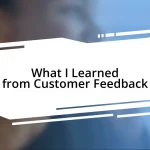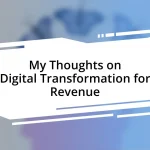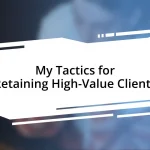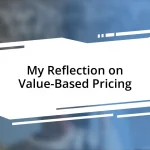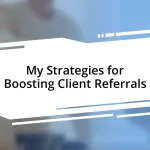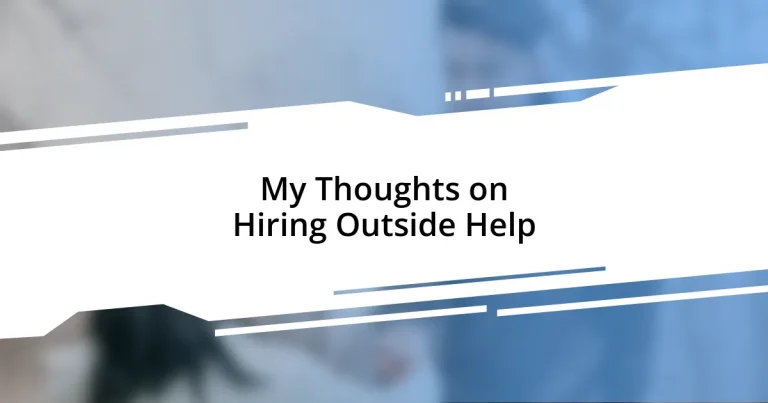Key takeaways:
- Recognizing the need for outside help enhances productivity and allows for a focus on strategic tasks rather than minor details.
- Assessing skills gaps through feedback and structured evaluation helps identify areas for improvement and guides professional growth.
- Setting clear expectations and maintaining open communication are essential for a successful working relationship with hired professionals.
- Utilizing a structured approach in the hiring process, including feedback from candidates, improves decision-making and enhances the overall experience.
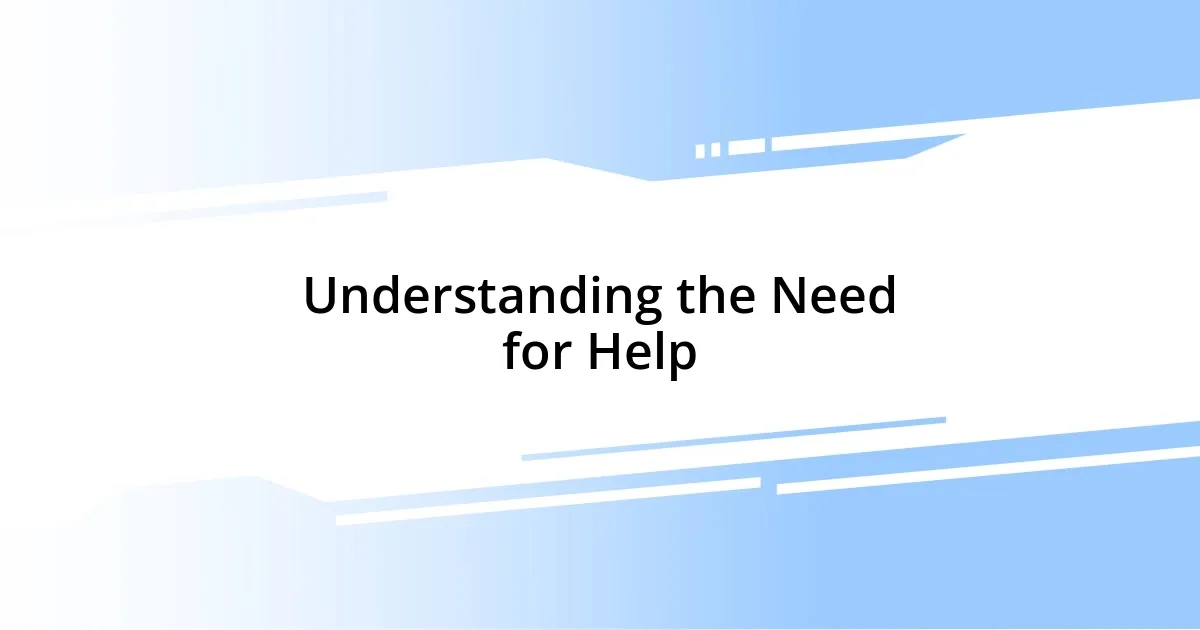
Understanding the Need for Help
Sometimes, I find myself overwhelmed by the sheer number of tasks on my plate. It’s moments like these that make me realize I cannot do everything alone. Have you ever felt like you were juggling too many balls in the air, just waiting for one to drop? I have, and it was during such times that I understood the profound necessity of reaching out for help.
There was a time when I hesitated to hire a virtual assistant, thinking it was an unnecessary expense. I vividly remember the day I finally made the leap. What a relief it was! I felt an immediate weight lifted off my shoulders. In moments of chaos, having a reliable helping hand allows one to focus on the big picture rather than getting tangled in minor details.
Understanding the need for help isn’t just about delegating tasks; it’s about recognizing our limits. Reflecting on my experiences, I realize that collaborating with others often leads to fresh perspectives and even better results. Isn’t it fascinating how a different set of eyes can spot opportunities we might overlook? This is the power of seeking outside help—transforming our struggles into strength through partnership.
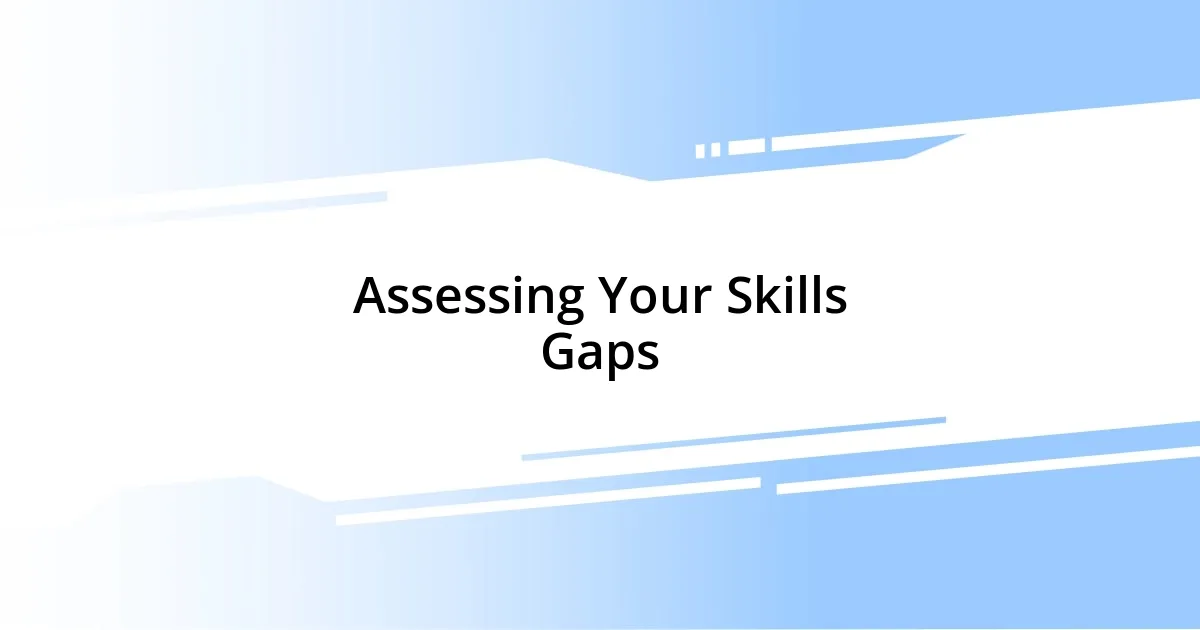
Assessing Your Skills Gaps
Assessing your skills gaps is essential for any professional looking to improve or expand their capabilities. I vividly remember a project where I thought I could handle design work myself. The truth is, I spent more time fumbling through design software than actually moving the project forward. That experience highlighted my lack of graphic design skills and pushed me to seek help, which ultimately led to a much more polished outcome. Have you ever faced a similar situation where your enthusiasm masked a skills gap?
Recognizing where your skills fall short doesn’t always come easily. I’ve often relied on feedback from peers and mentors to help me pinpoint my weaknesses. This approach has been invaluable; their insights provided clarity, revealing areas I hadn’t even considered as gaps. For instance, I didn’t realize how off my copywriting skills were until a colleague pointed it out. Their constructive criticism prompted me to seek additional training, which was a game changer for my work.
Ultimately, a structured assessment can streamline this process. I suggest creating a simple comparison table to evaluate your current skills against the abilities you need. This method not only clarifies what you genuinely excel at but also serves as a motivational map guiding your journey toward improvement.
| Current Skills | Skills Needed |
|---|---|
| Graphic Design | Advanced Design Techniques |
| Basic Copywriting | Persuasive Writing |
| General Project Management | Time Management |
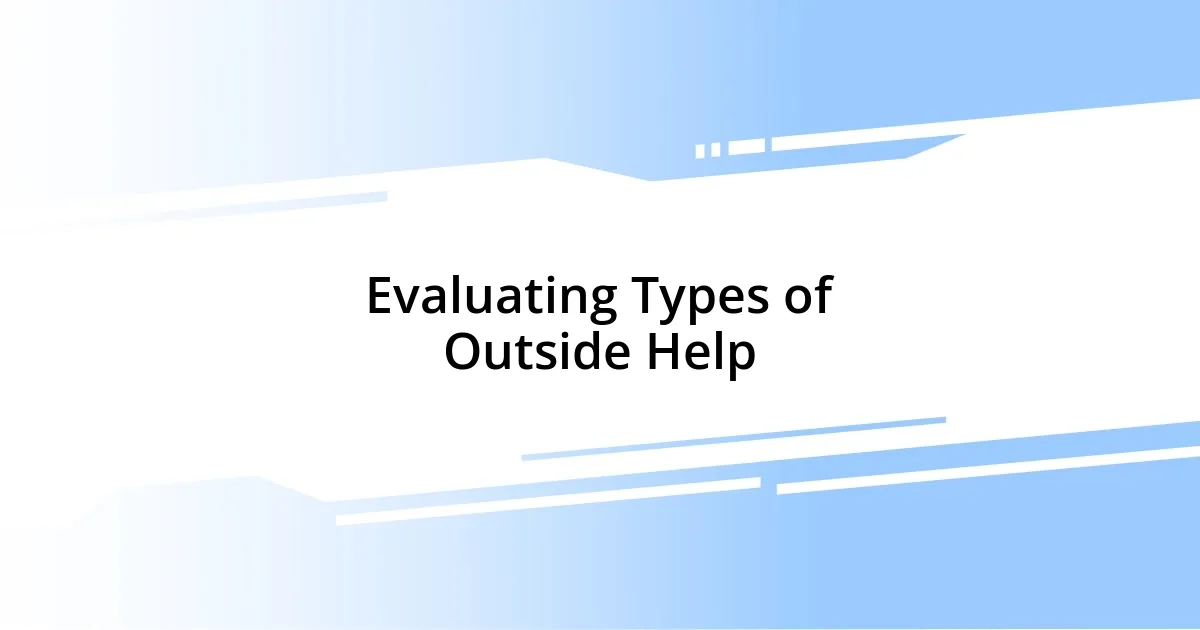
Evaluating Types of Outside Help
Evaluating outside help requires a thoughtful approach. I recall when I contemplated hiring a graphic designer for a client project. Initially, I thought it was easier to manage the visuals myself. But after a frustrating week, filled with trial and error, I faced the reality—I was sacrificing quality for convenience. That moment taught me the importance of recognizing the unique strengths that outside professionals can bring to the table.
Here’s how I evaluate different types of outside help:
- Freelancers: Flexible and often cost-effective, freelancers can provide specialized skills on a project basis.
- Agencies: If you’re looking for a comprehensive service, agencies offer diverse expertise and a team approach, albeit at a higher price.
- Virtual Assistants: These experts can handle administrative tasks, allowing you to focus on strategic aspects of your work.
- Consultants: Ideal for specific areas of expertise, consultants bring insights and strategies that can significantly improve your operations.
- Mentors or Coaches: Sometimes the best outside help comes from those who guide us through personal development and professional growth.
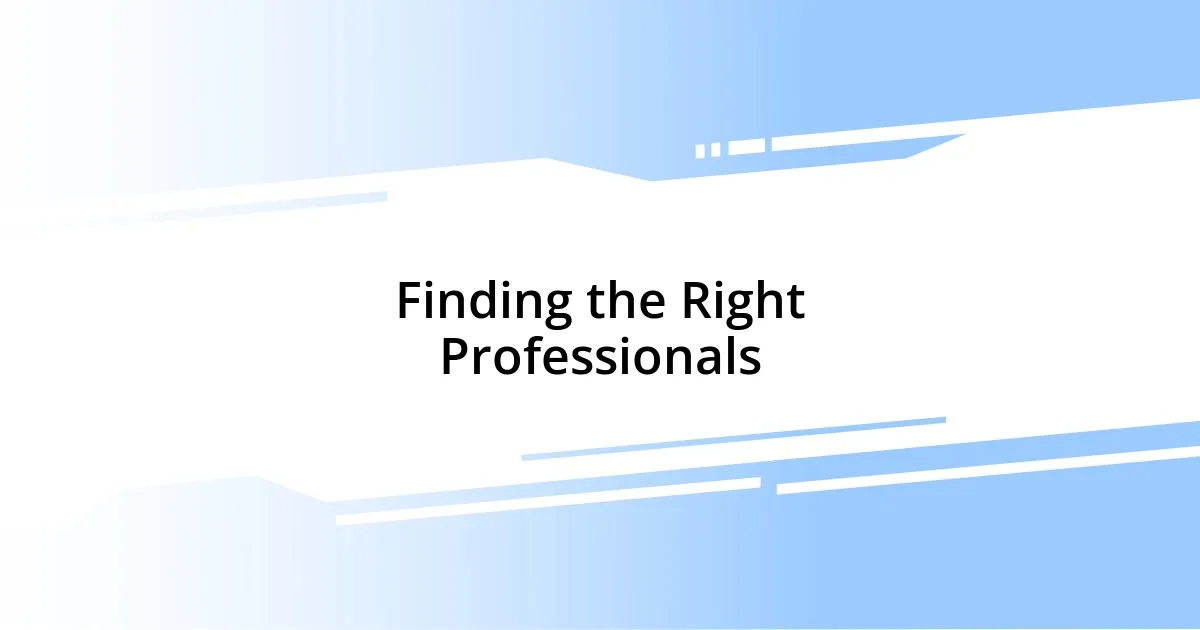
Finding the Right Professionals
Finding the right professionals can feel like a daunting task, but I’ve found that starting with clear criteria helps immensely. For example, I once needed a marketing consultant for a launch, and I prioritized candidates who not only had relevant experience but also shared my values regarding creative integrity. During the interviews, it became apparent that aligning with someone on a personal level is just as crucial as their technical skills. Isn’t it comforting to know that a solid connection can enhance collaboration?
When I look for outside help, I also consider their communication style. I recall working with a web developer whose communication was so poor it made the project a nightmare. I learned that a professional’s ability to articulate their ideas and be responsive can save you countless headaches down the line. Think about it: if you’re bringing someone on board to help, wouldn’t you want to work with someone who makes you feel heard and understood?
Finally, I assess their portfolio carefully. One time, I hired a social media manager whose previous work looked phenomenal on the surface, but once we started collaborating, I realized their style didn’t mesh with my brand voice. This experience taught me that the initial impression can be misleading. It’s worth taking the time to dig deeper, ask questions, and perhaps seek out trial projects to ensure their style aligns with your vision. Isn’t it better to invest some time upfront than to deal with mismatched priorities later on?
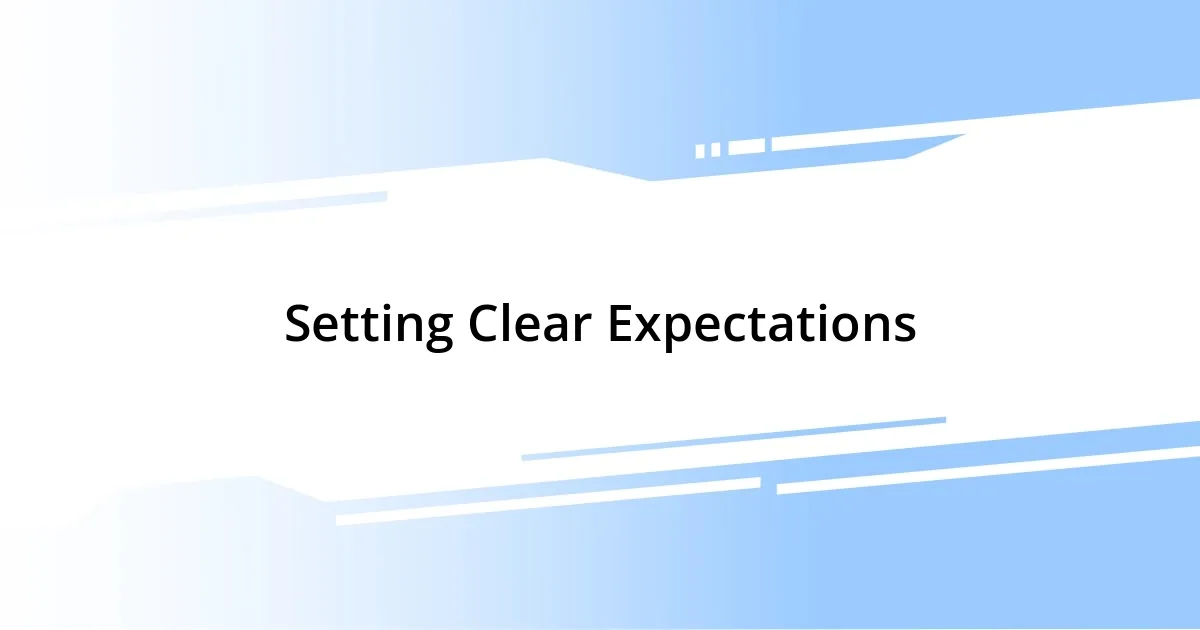
Setting Clear Expectations
Setting clear expectations is crucial when working with outside help. I remember the time I hired a temporary project manager for a significant event. Not discussing specific deliverables upfront led to misunderstandings that resulted in last-minute chaos. We learned that clarity is key; detailing every task and timeline can save heartache and stress later on, don’t you think?
One invaluable lesson I’ve learned is the importance of defining success benchmarks. When I partnered with a freelance content writer, we crafted a shared vision early on. Setting metrics for engagement helped us both stay aligned and motivated throughout the project. What’s remarkable is how those clear expectations allowed us to celebrate milestones together, creating a rewarding collaborative atmosphere.
Additionally, I cannot stress enough the role of regular check-ins. I once worked with a branding expert who had great ideas but often strayed from our agreed-upon goals. By scheduling weekly updates, we were able to refocus our efforts and maintain a productive dialogue. Establishing that rhythm of communication made all the difference. Have you ever experienced the relief of knowing you’re on the same page with someone? It really does transform the entire working relationship.
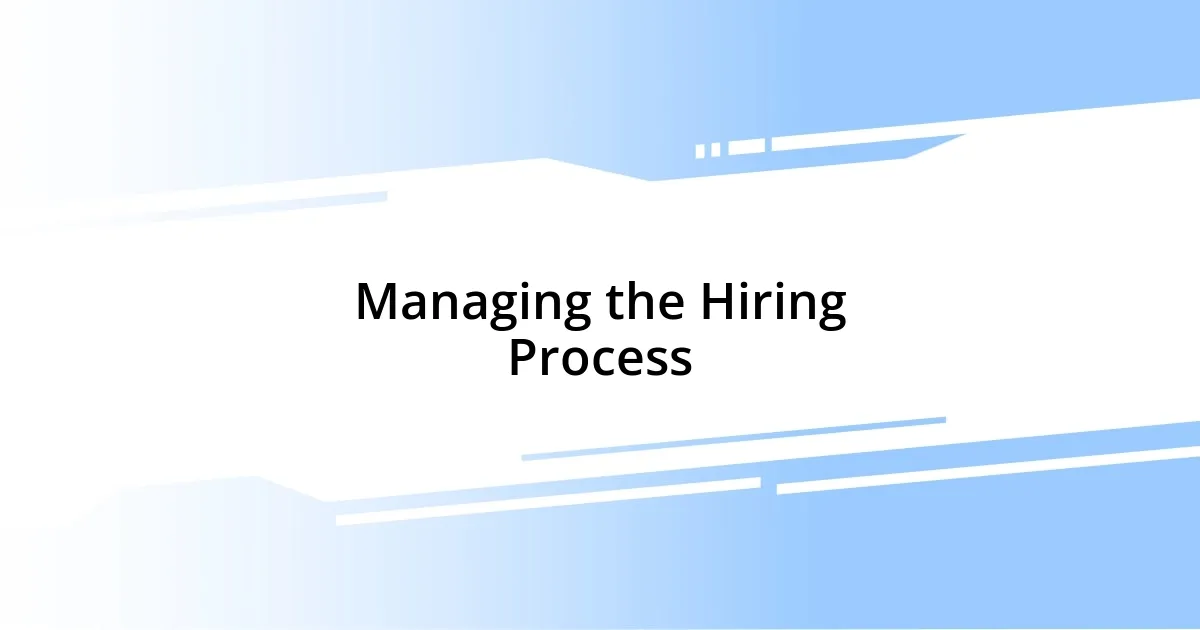
Managing the Hiring Process
Managing the hiring process can be as daunting as it is rewarding. I remember when I organized my first major recruitment. I felt overwhelmed by the sheer volume of applications but realized that utilizing clear criteria and a structured approach made it much more manageable. When I developed a scoring system to evaluate candidates, everything fell into place. Have you ever found a simple tool that changed your entire perspective?
Communication is another vital ingredient in this process. During one of my hiring experiences, I set up a group chat for all candidates to ask questions. This openness not only provided clarity but also allowed me to gauge their enthusiasm and engagement. It was fascinating how quickly candidates stepped up with insightful questions, further illuminating their passion for the role. Wouldn’t you agree that fostering an open dialogue creates a more inviting environment for potential hires?
Finally, I can’t stress enough the importance of feedback. After one hire turned into a challenging experience due to a lack of clarity on my end, I made it a priority to solicit thoughts from both successful and unsuccessful candidates. The insights I gathered reshaped my hiring process significantly. It was eye-opening to learn that candidates appreciate knowing where they stand and value constructive criticism. Have you ever realized that feedback could enhance not only your process but also your reputation?

